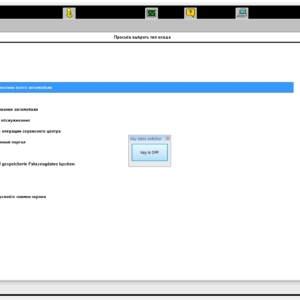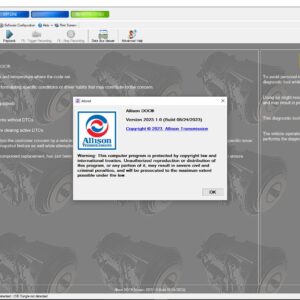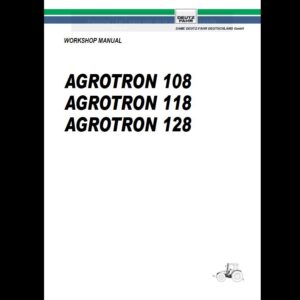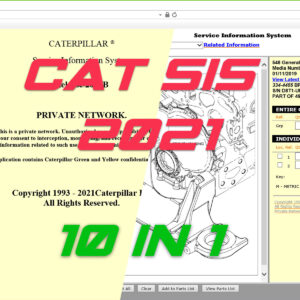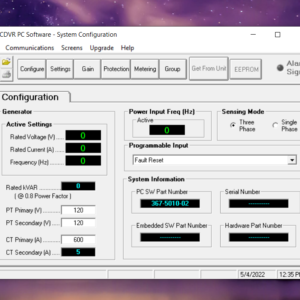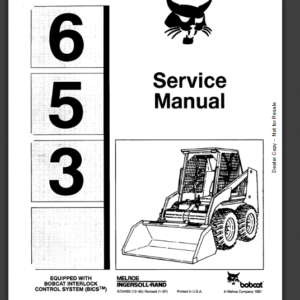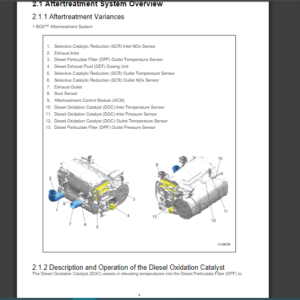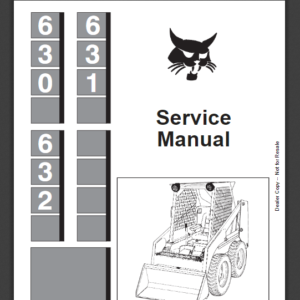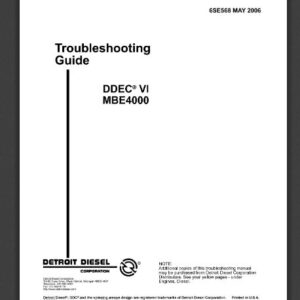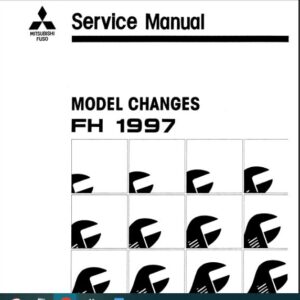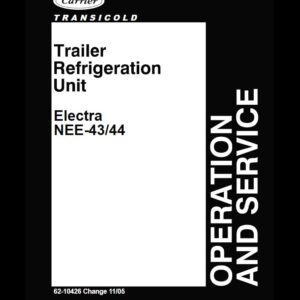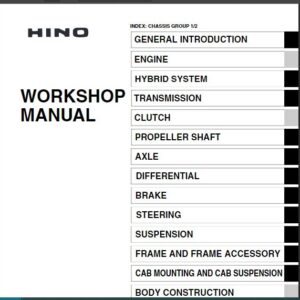Cummins ISX11.9 CM2250 (2010-12) Fault Code: 5716 PID: SPN: 3610 FMI: 10 Aftertreatment Diesel Particulate Filter Outlet Pressure- Abnormal Rate of Change
Circuit Description
The engine control module (ECM) provides a 5 volt supply to the aftertreatment diesel particulate filter outlet pressure sensor on the sensor supply circuit. The ECM also provides a ground on the sensor return circuit. The ECM aftertreatment diesel particulate filter outlet pressure sensor provides a signal to the ECM on the aftertreatment diesel particulate filter outlet pressure sensor signal circuit. This sensor signal voltage changes based on the pressure at the outlet of the aftertreatment diesel particulate filter.
Component Location
The aftertreatment diesel particulate filter outlet pressure sensor is mounted on the diesel particulate filter. It is a combination sensor that detects both diesel particulate filter differential pressure and outlet pressure. See equipment manufacturer service information for exact location of the aftertreatment system.
Conditions for Running the Diagnostics
This diagnostic consists of two parts:
One part runs when the keyswitch is initially turned ON before the engine is started.
The other part runs continuously when the engine is operating.
Conditions for Setting the Fault Codes
The ECM detects that the aftertreatment diesel particulate filter outlet pressure is greater than 1.5 kPa [0.22 psi] or less than -1.5 kPa [-0.22 psi] at initial key ON, or is not changing with engine conditions.
Action Taken When the Fault Code is Active
The ECM illuminates the amber CHECK ENGINE lamp and/or malfunction indicator lamp (MIL) immediately when the diagnostic runs and fails for two consecutive trips.
The active and stationary regeneration of the diesel particulate filter will be disabled.
The exhaust gas recirculation (EGR) valve will be closed.
Engine torque will be reduced if the engine is operated for an extended period of time with this fault active.
Conditions for Clearing the Fault Code
To validate the repair using a Diagnostic Road Test, utilize a route that incorporates both stop-and-go city driving and steady state highway driving. It may be necessary to load the unit for certain diagnostics in the ECM to run.
To vaildate the repair using a Chassis Dynamometer Test, utilize a routine that incorporates acceleration and motoring events, steady state highway operation, and load. This will simulate normal driving and allow the diagnostics in the ECM to run.
The fault code status displayed by INSITE? electronic service tool will change to INACTIVE immediately after the diagnostic runs and passes.
The ECM will turn off the amber CHECK ENGINE lamp after the diagnostic runs and passes.
For on-board diagnostic (OBD) engines, the ECM will turn off the MIL after three consecutive trips where the diagnostic runs and passes.
The “Reset All Faults” command in INSITE? electronic service tool can be used to clear active and inactive faults, as well as extinguish the MIL for OBD applications.
Shop Talk
Possible causes of this fault code include:
Stuck in-range aftertreatment diesel particulate filter outlet pressure sensor reading
High resistance in the aftertreatment diesel particulate filter outlet pressure sensor SIGNAL or RETURN wires
Higher than expected diesel particulate filter outlet pressure
Excessive diesel exhaust fluid deposits in the aftertreatment decomposition tube
Plugged aftertreatment outlet pressure sensor ports could cause this fault code if pressure is held in the port after the engine is turned OFF.
Note: It is possible to set this fault in a shop environment by performing a key cycle with the tailpipe connected to an exhaust ventilation system.
Referenece the appropriate original equipment manufacturer (OEM) wiring diagram when troubleshooting circuits that utilize wiring supplied by the OEM.
For intermittent power supply and data link communication issues with aftertreatment components, it is highly recommended that the OEM power distribution center fuses and relays be thoroughly checked for loose, missing, or intermittent connections.
Possible Cause:
1) Aftertreatment DPF differential Pressure Sensor failure
2) OEM harness
3) ECM calibration
-
DPF EGR SCR BAC ERG Delete & Flash CAAT Cummings Detroit Dodge Mack Volvo Collection of DELETE files
CAT $200.00Rated 0 out of 5
-
Eaton Service Ranger 4.9 Engineering 4.9 [05.2021] Engineering Level ( 1 PC )
Eaton $67.00Rated 0 out of 5 -
download MANCATS II v14.01 2014 Diagnostic software MAN CATS ( virtual machine )
MAN $75.00Rated 0 out of 5 -
10 IN 1 FOR CAT SIS Caterpillar 2021 Full Service Dealer INCLUDING CAT 2019 C
CAT $110.00Rated 0 out of 5 -
CAT CDVR PC Software – Caterpillar Digital Voltage Regulator (CDVR) WINDOWS 10
CAT $45.00Rated 0 out of 5
Related products
-
Allison 1000 & 2000 Gen 4 Fault Codes: P1892 Throttle Position Sensor Pulse Width Modulation (PWM) Signal High Input
1000 & 2000 Gen 4 $50.00Rated 0 out of 5 -
Allison 1000 & 2000 Gen 4 Fault Codes: P2773 Torque Control Request Ignored – ECM/TCM
1000 & 2000 Gen 4 $50.00Rated 0 out of 5 -
Allison 1000 & 2000 Gen 4 Fault Codes: P0871 Transmission Pressure Switch Solenoid E Circuit Stuck Open
1000 & 2000 Gen 4 $50.00Rated 0 out of 5 -
Allison 1000 & 2000 Gen 4 Fault Codes: P0872 Transmission Pressure Switch Solenoid E Circuit Stuck Closed
1000 & 2000 Gen 4 $50.00Rated 0 out of 5 -
Allison 1000 & 2000 Gen 4 Fault Codes: P0847 Transmission Pressure Switch Solenoid D Circuit Stuck Closed
1000 & 2000 Gen 4 $50.00Rated 0 out of 5 -
Allison 1000 & 2000 Gen 4 Fault Codes: P1688 Unmanaged Engine Torque Delivered To TCM Signal
1000 & 2000 Gen 4 $50.00Rated 0 out of 5 -
Allison 1000 & 2000 Gen 4 Fault Codes: P2810 Solenoid G Electrical
1000 & 2000 Gen 4 $50.00Rated 0 out of 5 -
Allison 1000 & 2000 Gen 4 Fault Codes: U1000 Class 2 Loss of Serial Data Communication
1000 & 2000 Gen 4 $50.00Rated 0 out of 5 -
Allison 1000 & 2000 Gen 4 Fault Codes: U1300 J1850 (Class 2) Serial Data Communication Link Low
1000 & 2000 Gen 4 $50.00Rated 0 out of 5 -
Allison 1000 & 2000 Gen 4 Fault Codes: P1779 Engine Torque Delivered To TCM Signal
1000 & 2000 Gen 4 $50.00Rated 0 out of 5 -
Allison 1000 & 2000 Gen 4 Fault Codes: P1891 Engine Throttle Position Sensor Pulse Width Modulation (PWM) Signal Low Input
1000 & 2000 Gen 4 $50.00Rated 0 out of 5 -
Allison 1000 & 2000 Gen 4 Fault Codes: P0123 Pedal Position Sensor Circuit High Voltage
1000 & 2000 Gen 4 $50.00Rated 0 out of 5 -
Allison 1000 & 2000 Gen 4 P0719 Brake Switch ABS Input Low
1000 & 2000 Gen 4 $50.00Rated 0 out of 5 -
Allison 1000 & 2000 Gen 4 Fault Codes: U1016 Class 2 J1850 (Class 2) Powertrain Controller State of Health Failure
1000 & 2000 Gen 4 $50.00Rated 0 out of 5
-
SERVICE MANUAL International Engines DT466 & DT570 (2004-2006) D
INTERNATIONAL ENGINES $34.00Rated 0 out of 5

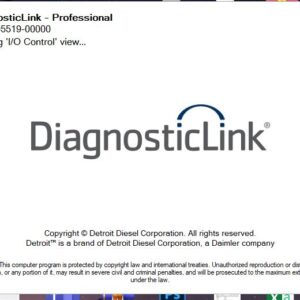
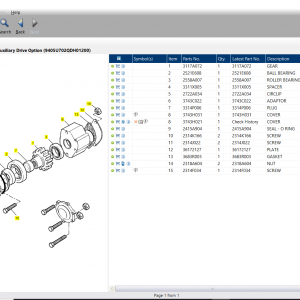
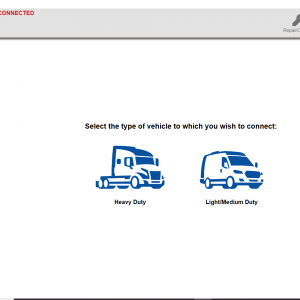

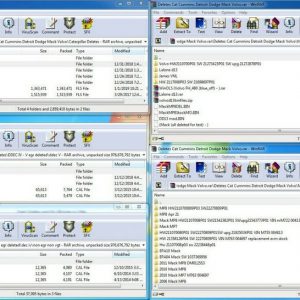
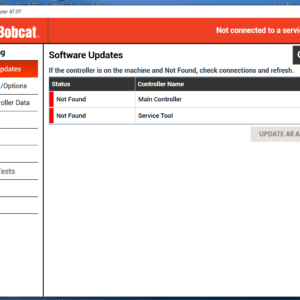
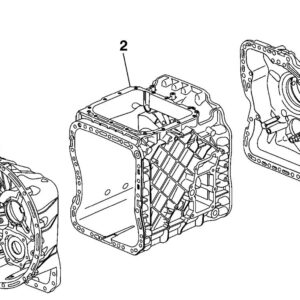

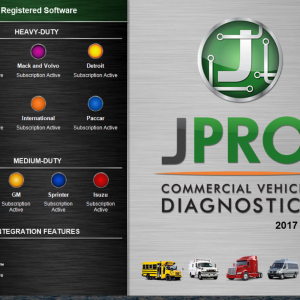
![Volvo Penta EPC 6 Offline VMware [12.2021] VMware](https://www.ecuforcetruck.com/wp-content/uploads/2022/11/VOLVO-PENTA-2021-A-300x300.jpg)
